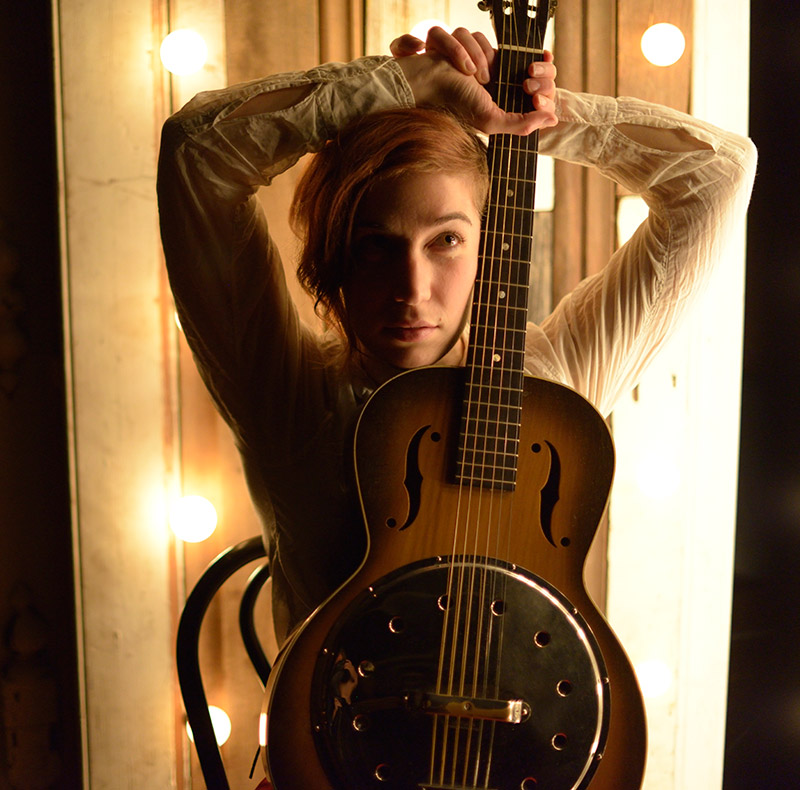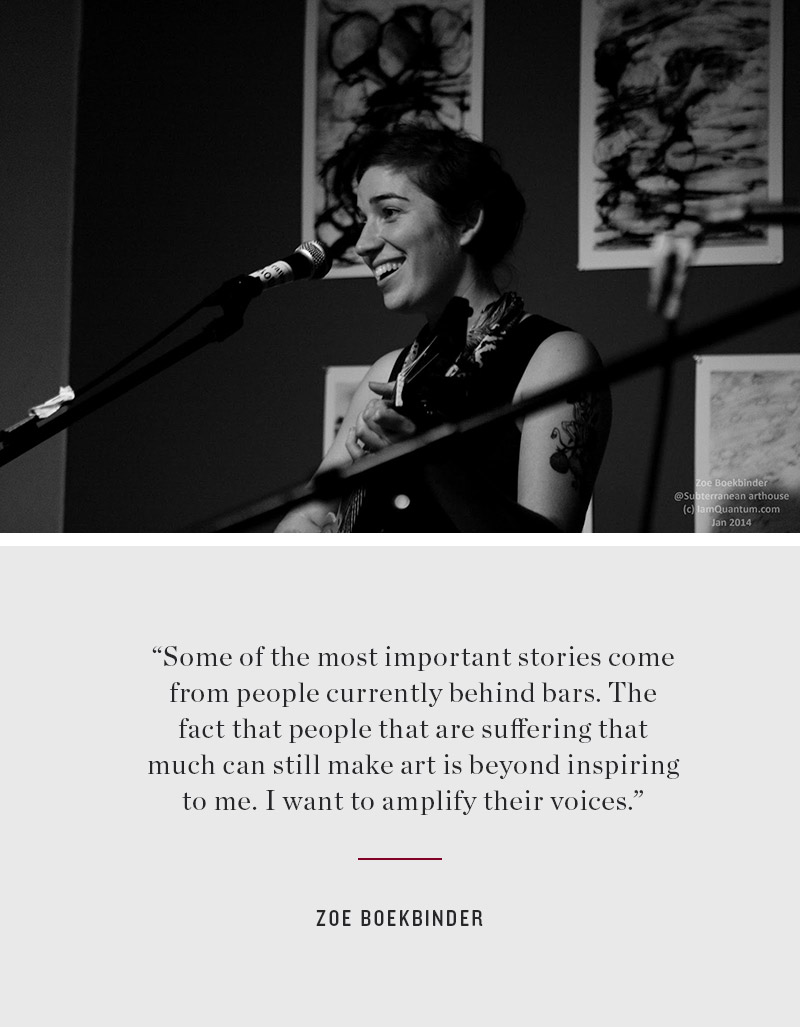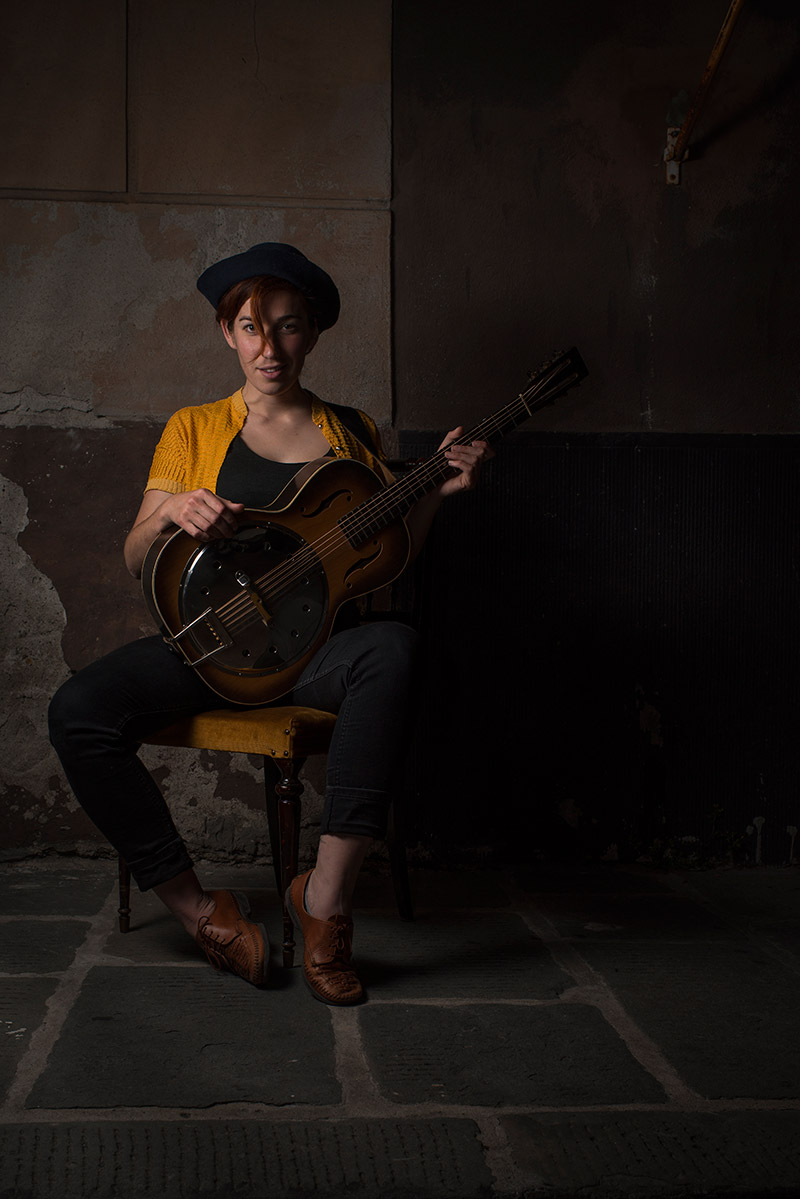
To do the work you love, you’ve got to unlock a few doors. UNLOCKED Stories are honest conversations with people who chose a path + made it happen.
A note from Ellen: I’m thrilled to spotlight Zoe Boekbinder — a musician, social activist, and founder of The Prison Music Project.
I almost don’t have the words to describe how deeply Zoe’s story has affected me. So, I’ll skip my usual preamble. Instead, I invite you to simply… read on.
What do you do?
[Zoe]: I make music.
I’ve been making music for a living for nearly 9 years — since I was 20 years old.
I’ve done a number of different projects in that time — including forming a band with my sister called Vermillion Lies, releasing some solo records, and at one point, writing and recording 100 songs in 100 days.
Getting to make music and touring the world is definitely a thrill.
But four years ago, I began a project that changed the course of my life.
I started working with poets and songwriters at a maximum-security men’s prison called New Folsom.
It all started with collaboration between myself and a rapper I met at the prison. He goes by the name of “Shell Dog,” and he was incarcerated when he 18 years old.
Shell Dog gave me permission to use his rap lyrics for a song.
Word got around, and soon, other writers at the prison were approaching me with their raps, lyrics and ideas. That single song evolved into a full-length album that includes about ten incarcerated songwriters.
Its working title is The Prison Music Project.
Why prison? Seems like the last place on earth that anyone would want to go, let alone write music!
[Zoe]: Some of the most important stories come from people currently behind bars. The fact that people that are suffering that much can still make art is beyond inspiring to me. I want to amplify their voices.
I don’t want their work — and their stories — to go unheard.
I have other motivations for doing this work, too.
For starters: there are studies that show that art and music programs in prisons lower the incidence of violence within the prison as well as significantly lower the recidivism rates for those involved in such programs. This benefits everyone: the prison, the incarcerated people, and the society that these people will eventually re-enter.
Music can provide an outlet, it is humanizing.
I believe that music can help to stop the cycle of incarceration.
In every career, there are a few “locked door moments” — moments where it seems like all hope is lost, or the project is blocked.
What has been your biggest “locked door moment,” so far?
[Zoe]: With the work that I’m doing, there are… literal locked doors.
One of the biggest challenges has been finding a way to collaborate with the writers inside the prison, without violating prison protocol.
I am allowed into the prison, but I’m not allowed to carry anything out that I didn’t bring it with me. I can’t accept anything from any of the people incarcerated there. If I correspond with them through the mail or phone, I won’t be allowed in anymore.
Recordings of any kind must be approved, as New Folsom is a maximum-security facility, and that is a long process. We did get approval to record inside, but only in one isolated section of the prison, and now need to go through another lengthy process to get approval to use these recordings.
I am not hopeful about this last step but prepared to move forward either way. If we cannot use these recordings, the songs will be performed entirely by a broadcast of artists who are not incarcerated. If we do get permission to use them we are excited to add production and secondary instrumentation to these existing recordings.
At this time, The Prison Music Project is still… a work in progress. You’re seeking funding to complete the project and bring this music to the world. What’s the next step?
[Zoe]: The record is a non-profit project. We are looking for grants and private donations to help cover the overhead costs so that the profits from sales can go immediately to supporting re-entry programs for people getting out of prison. There are currently a lot of challenges facing people re-entering society, like the denial of government assistance with food and housing.
The success of this project matters so much more to me than anything else I’ve ever done.
I feel responsible for the writers I’ve been working with, to make their stories heard, because they have been made incapable to do it for themselves.
Their stories must be heard, because they illustrate the injustices that so many people face. Poor people, people of color, addicts, transgendered people, and people with abnormal mental abilities/disabilities are not given a fair chance in this country.
One statistic to illustrate my point: people of color (non-white) make up 32% of the US population but 66% of the incarcerated population. This is a problem. Take for instance the facts that have been coming to the surface recently about police brutality that is disproportionately aimed at minorities.
But getting back to your question: you asked about “next steps.”
One thing I did recently — that I’ve never done before — was to approach a hero that I have always wanted to work with.
I asked Ani DiFranco if she would produce the record… and she said yes.
Our first recording dates are set to take place before the end of this year.
What’s the next door that you need to unlock? (And what’s the plan?)
[Zoe]: I know that while The Prison Music Project is captivating, it is also complicated.
I don’t know if everyone will feel comfortable with the idea of these stories being shared, because of whom they belong to.
I don’t know what any of these people did to end up incarcerated. I don’t have access to that information and I don’t want to. It isn’t the point, as far as I’m concerned.
I’m not saying every action is forgivable. I’m just saying that we need to look at how to restructure a society that has the highest incarceration rate in the world.
On the other side of things, some people may take issue with my role in this project. I think it would be understandable to question whether my use of words and songs written by these incarcerated people is appropriate or appropriative.
I have confidence in my convictions and am trying to be respectful, delicate, radical, and responsible with this project. I don’t want it to be about me, or any of the artists who will end up performing these songs in place of the people who wrote them.
I simply want to be a microphone and I hope that message is clear throughout this process.
The next door that I need to unlock is approaching people to get involved in the project either as guest performers or as funders.
I’m prepared to reach out to my dream collaborators and wealthy philanthropists, even if I hear a lot of “no’s.” I know not everyone shares my views and I have to be ready for some rejection and criticism. I do hope, though, that they feel as inspired by this project as I am. We’ll see what happens.
Last but not least: What’s your biggest piece of advice for anyone who wants to stay motivated, do amazing work and unlock major doors?
[Zoe]: Find the thing that inspires and drives you the most, and you won’t need my advice.
UNLOCK yourself
Three questions to think about, write about — or talk about with a friend.
1. Zoe started her music career as many musicians do — writing songs, playing in a band, and touring the country. She enjoyed it, but something was missing. She was searching for a mission that was “bigger” than just… her. She found that cause with The Prison Music Project.
: Is there a facet of society — the prison system, the education system, the healthcare system, or something else — that bothers you, deeply? What’s one way you could work to do something about it?
2. Zoe took a big risk by approaching one of her personal heroes, Ani DiFranco, and asking her to produce the album for The Prison Music Project. Happily, Ani said “yes.”
: Is there someone — a writer, a leader, a hero — that you would love to collaborate with, someday? Who? And why?
3. Zoe knows that not everybody will be happy about The Prison Music Project. She may even receive some harsh criticism. But she’s ready to face it, because she believes in the project so strongly.
: How do you handle criticism and rejection? What could you say to yourself the next time you’re facing an unpleasant rejection, to stay strong… and keep going?
A great article about the Art’s program in the prison and Zoe’s project can be found here.
To learn more about this project and to see how you can support it- visit Zoe’s website here
For more UNLOCKED interviews, click over here.
Know somebody that ought to be spotlighted? Write to me here.
See you next time for another inspiring conversation!



